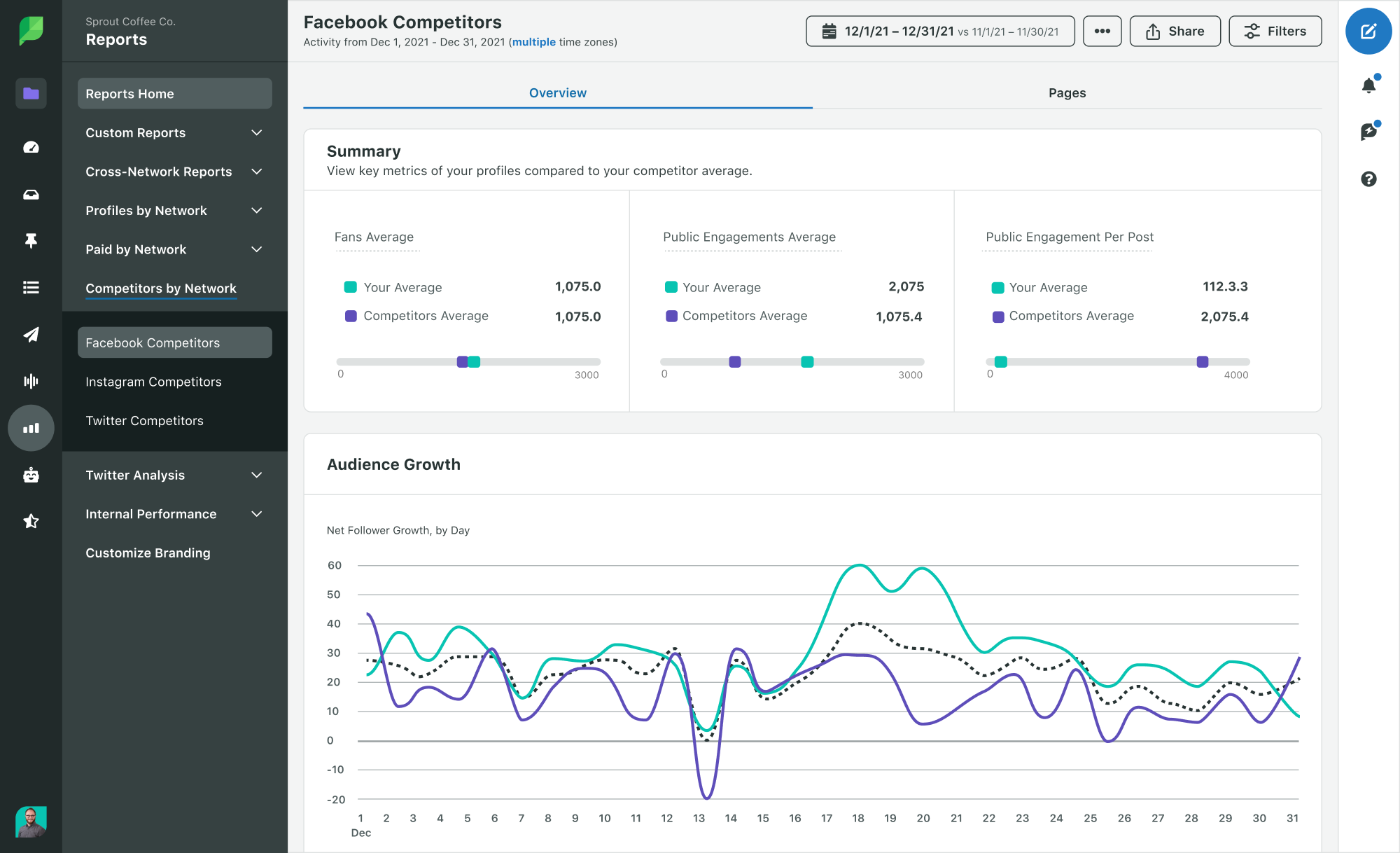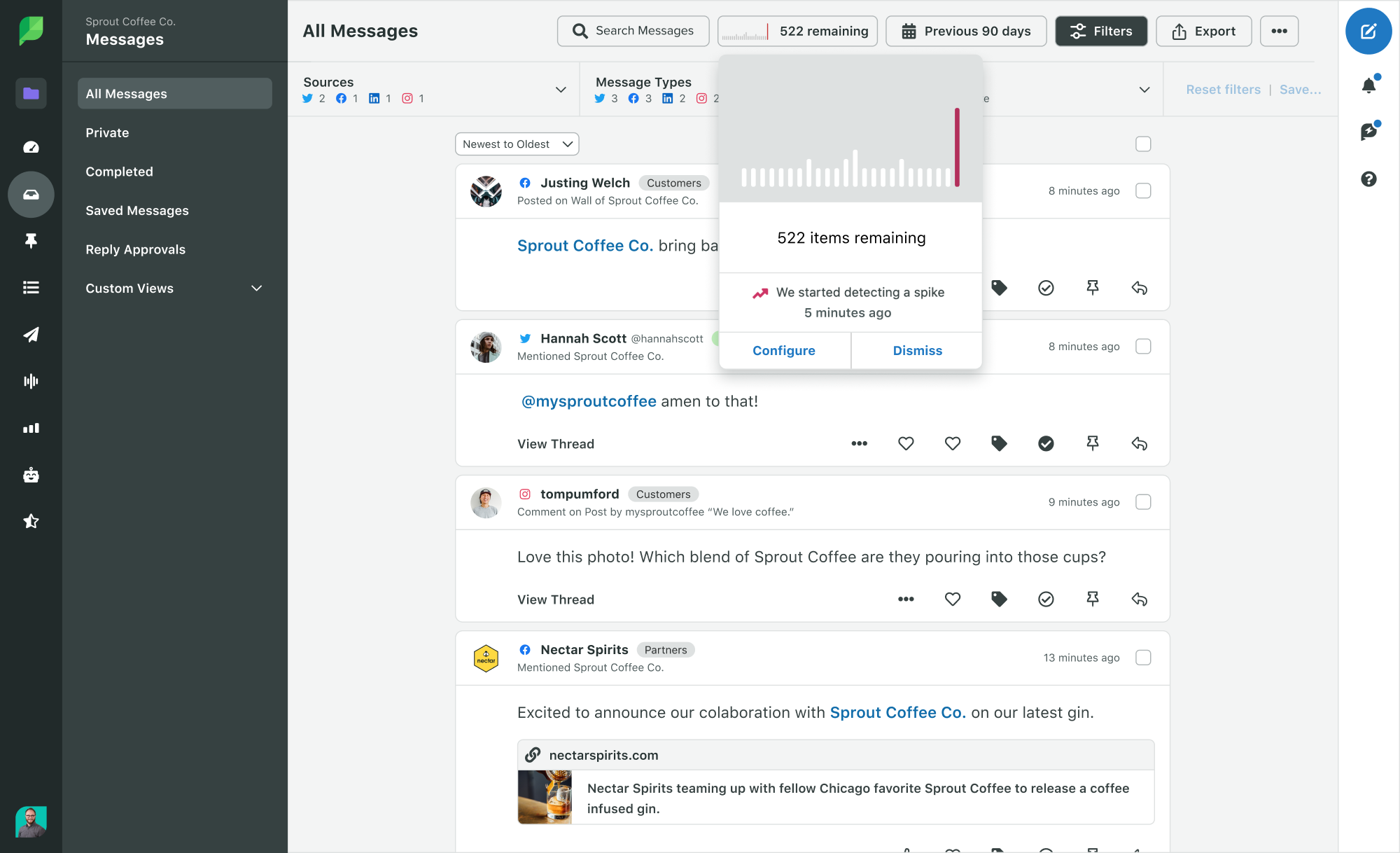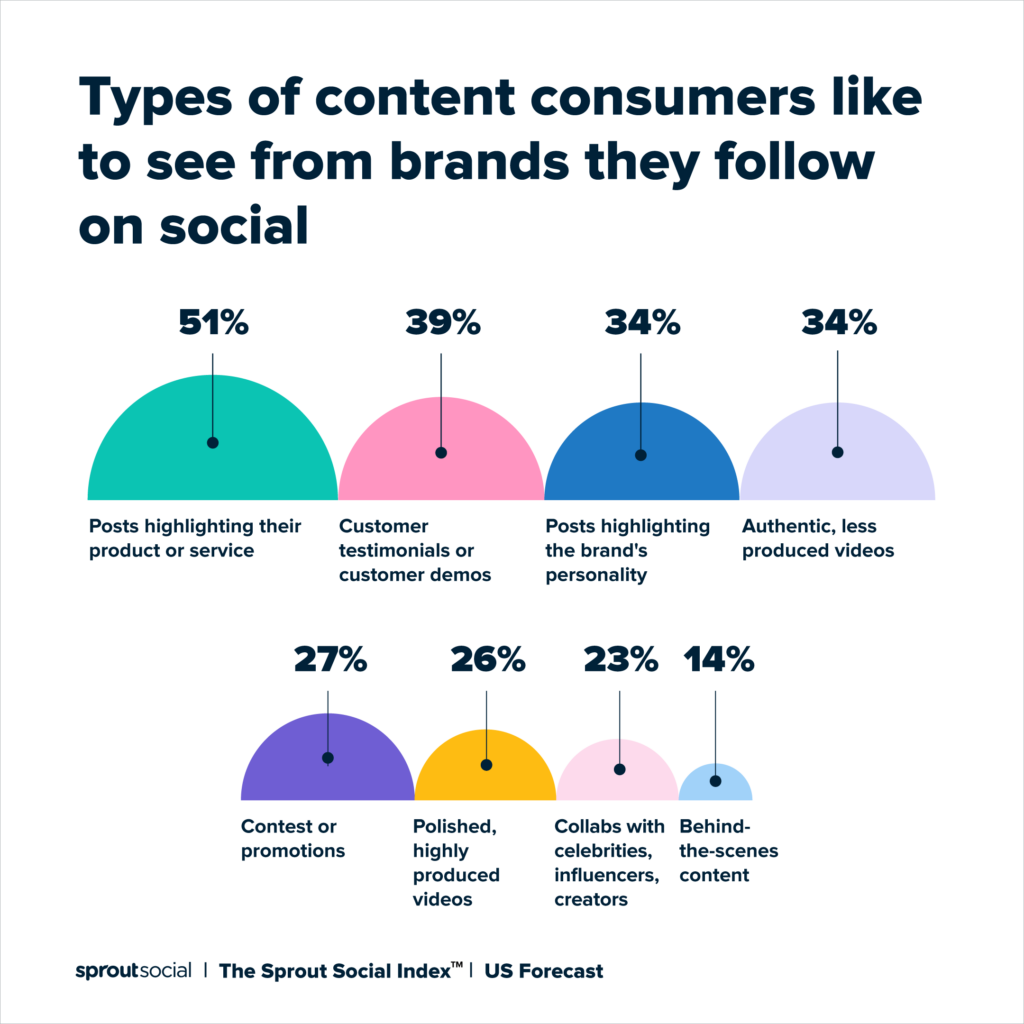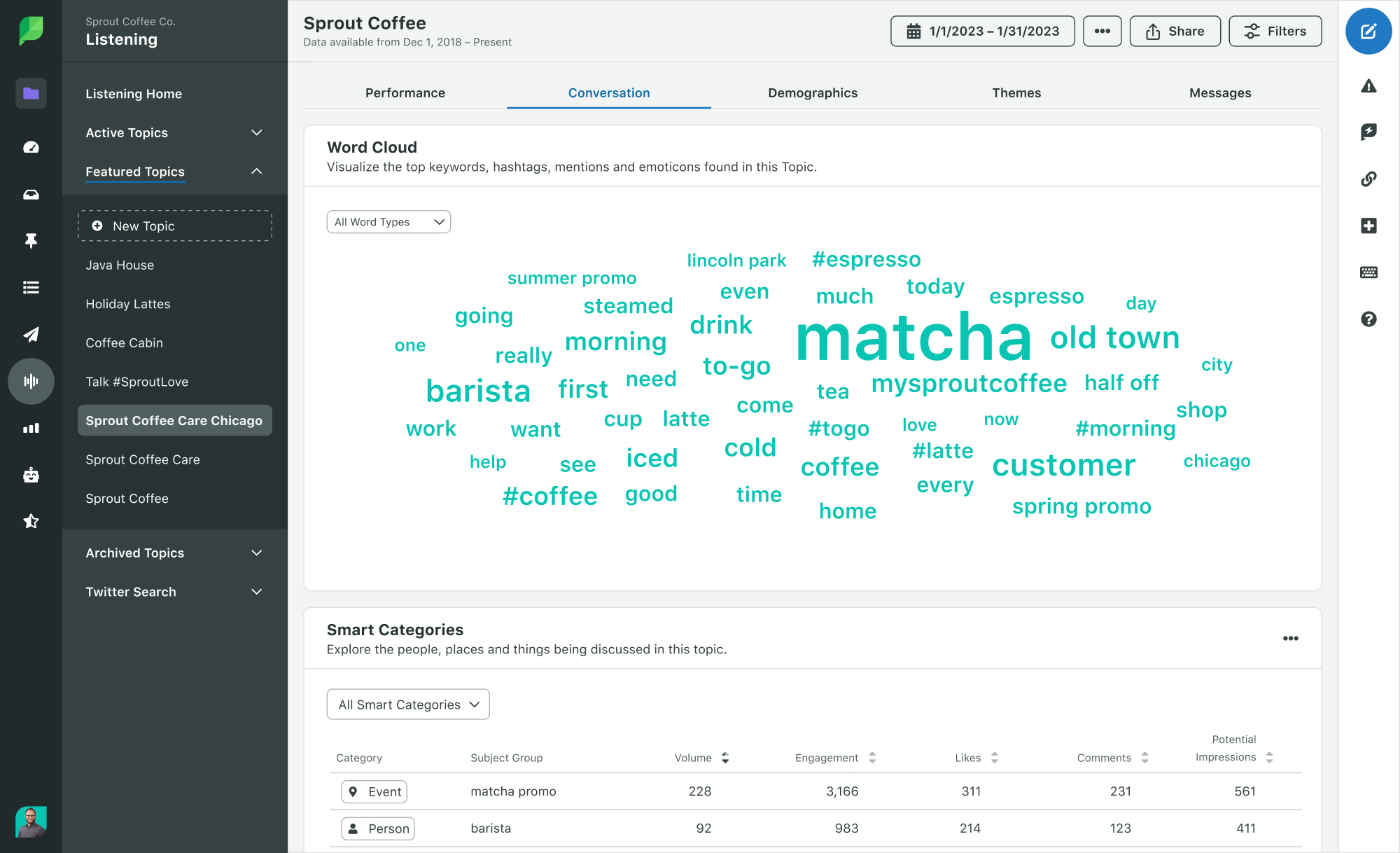Conversational analytics: How to use social listening for brand insights
Written by Annette Chacko
Published on August 22, 2023
Reading time 7 minutes

Artificial intelligence (AI) technologies, especially natural language processing (NLP) and machine learning (ML) have transformed social media listening tools into comprehensive platforms for business intelligence. In doing so, they have leveled the playing field for brands of all sizes and industries.
Within these tools, conversational analytics harnesses the power of customer conversations and discussions by identifying and tracking hidden brand insights. This market-driven, real-time intelligence empowers marketing teams to amplify brand reach in a targeted manner, spot emerging trends and gain competitive insights. Thus, enabling you to create a better customer experience that translates into repeat business and profitable revenue streams.
Continue reading to see how conversational analytics impacts your business by leaning into social data for rich insights and empowering business leaders to make strategic decisions.
What is conversational analytics?
Conversational analytics is actionable intelligence in the form of trends and reports derived from analyzing customer conversations using AI and machine learning.

Sophisticated social listening tools, powered by ML and AI technologies like sentiment analysis and NLP, scan millions of data points in customer chatter to understand consumers’ needs, wants and brand experience. This provides crucial insight into your brand health, market trends and competitor performance, enabling you to grow your business strategically with data-driven insights.
Important sources for conversational analytics include social media listening, virtual agent and chatbot interactions, customer care emails, review forums, sales calls and other feedback channels.
What are the benefits of conversational analytics?
Social listening tools powered by conversational analytics discover relevant information from thousands of customer comments and conversations within seconds. Thus, enabling your teams to concentrate on strategy and business impact rather than manual data analysis.
Here is a closer look at the key benefits.
Enhance customer experience
According to research, brands focused on building positive customer experiences are 60% more profitable compared to those that aren’t.
Keeping a tab on social customer care conversations helps you uncover common themes and topics, revealing service or product issues that would otherwise go unnoticed. This helps you elevate your customer experience strategy to build loyalty and attract new customers. Plus, it supports cross-functional teams by providing customer-centric insights to propel their efforts forward and improve the overall brand experience.
Discover brand insights
Brand insights from conversational analytics enable you to grow your social presence and improve brand perception. They aid you in making key business decisions like choosing the right social media influencers for your brand or building successful co-branding partnerships like Spotify and Starbucks, where Starbucks customers can sign-up for a free Spotify premium subscription.
Gain competitive intelligence
According to The Sprout Social Index™ 2022, 90% of marketers agree social insights help differentiate their brands in the market for a competitive edge. With conversational analytics, glean countless customer discussions and conversations around competitors and your brand on networks like Reddit, Google My Business (GMB), Glassdoor, Facebook and Instagram to derive competitive intelligence.
AI tasks like entity chunking and machine learning effortlessly detect competitor brand names in customer comments on your social channels or on review platforms to give you a contextual understanding of those conversations. When combined with other areas like social engagement, these insights help you map out competitive benchmarks and track what your competitors are doing to inform your strategy.

Improve sales conversions
Conversational analytics tools help you gauge what aspects can jumpstart your sales conversions based on customer preferences and the latest developments in the market.
For example, automated filtering and categorization of topics in social listening data surface opportunities in real-time to enhance the customer journey and influence purchase decisions. This enables you to develop successful short-term strategies like relevant discounts and incentives to take advantage of what’s trending.
Track and manage brand health
Measure and manage your brand reputation by regularly monitoring and engaging with customer conversations on social and review sites. This is important because a timely response to feedback, negative or positive, is important to customers, as our 2022 Index revealed.

Social listening tools assist you in tracking brand sentiment, especially from networks that best capture your audiences like Yelp and Trustpilot for hospitality or GMB for local businesses. Plus, set alerts for spikes in brand mentions and use the insights to guide your online review management strategy.

With Sprout, you can also merge your review management system with CRMs like Zendesk, HubSpot, Salesforce and Microsoft Dynamics 365 to get a holistic view of customer feedback.
Build your employer brand
Conversational analytics through social listening on networks like Glassdoor gives you a comprehensive view of your employee experience and how they perceive your company culture. This is an important aspect of employee development because happy employees are essential for a profitable business.
They are also your best evangelizers and key to building your employer brand. Employee advocacy helps you grow your business by reaching a much larger new audience compared to traditional social media tactics. For example, Simpli.fi reached one million unique users just with their sales teams using employee advocacy.
Product innovation
Conversational analytics enables you to keep a pulse on rising industry trends by identifying common topics in customer conversations. These could be direct messages on your social channels or chatbots, or discussions on customer forums.
Insights from market indicators can predict customer needs, changing preferences and purchase motivators. This helps drive product innovation for an evergreen growth strategy that keeps evolving.
Create engaging content
Conversational analytics give you precise indicators into what content resonates with your audience. This is critical given that customer preferences can be vastly diverse as seen in our latest Index where 34% of customers preferred low-fi content from brands they follow, 51% preferred product-driven content and 39% loved real customer demos.

Track content performance and measure key performance indicators (KPIs) to check on audience growth, hashtag usage, post/content type, volume and frequency to improve brand amplification and social engagement.
It is useful to remember that other social media analytics can also support improving your business’s insight into some of these areas as well.
How does conversational analytics software work?
Conversational analytics is a key component of AI marketing because it allows you to dig into tons of customer feedback data for insights that truly matter to your business. Here is a look at how the technique works under the hood.

Identify objectives
The first step to getting relevant insights from social listening is zeroing in on your objectives. For example, ask yourself: Are you using data analysis to meet long-term goals like enhancing customer experience or short-term goals like click-through rates (CTRs) to encourage a trial or purchase? Having this perspective helps you narrow your focus into high-priority areas and results that will best support your goals.
Gather relevant data
The more relevant the data source, the more accurate your insights. For example, choose industry-specific channels like TripAdvisor if you’re in the hospitality industry, or Yelp and GMB if you’re a local business.
These sources, along with customer interactions with virtual agents and chatbots on your websites, social media DMs and consumer forums like Reddit, will give you the critical brand insights you need.
Process the data
Filtering noise from tons of customer conversations and social chatter to get the right insights is the next step. Conversational analytics tools use AI tasks like NLP and named entity recognition (NER) to identify important topics and themes that emerge from data analysis. NLP and NER are also essential for sentiment analysis, so you can dig into conversational data to measure customer experience and brand health.
In Sprout, our Query Builder helps you sieve through millions of audience conversations to capture the full extent of the social listening data based on keywords and hashtags you choose. Plus, it can filter out spam to provide only those messages most relevant to your preferences.
Watch this video from one of our research experts to learn more.
Our AI-powered Queries by AI Assist further shapes your listening data by giving you additional keyword recommendations (words and phrases) to cut through congested feeds and create robust queries for more precise topic results.
The actionable insights derived from this processing enable you to build a multi-layer strategy to enhance customer service and maintain positive brand sentiment to grow market share holistically.
Visualize insights
User-friendly, presentation-ready reports are as important as the accuracy of the insights you receive, especially when you’re collaborating with internal stakeholders. These reports help you contextualize the data so you’re able to make decisions on the best next moves for your brand strategy.
For example, in Sprout, get in-depth, presentation-ready reports on hashtag trends, paid and organic breakdowns and conversion ratios that demonstrate the impact of your findings to decision-makers.

Plus, choose insight visualizations as word clouds to get trending topics at a glance.

Harnessing the power of social with conversational analytics
Powerful social media listening tools unlock the potential of your customer experience data seamlessly so you have the insights you are looking for at your fingertips.
Indiana University tapped into this opportunity, using conversational analytics to gather insights from audience feedback and comments across their social channels. They wanted to understand how former and current students, and families felt about their brand and if there were any specific concerns that needed to be prioritized and addressed.
Using Sprout’s listening and analytics capabilities, they proactively identified and tracked issues as they arose. This enabled them to provide actionable insights to the institution’s leadership team and develop an effective social response strategy to manage brand health.

They were also able to have a unified brand strategy across departments to enhance community engagement and solidify relationships with partners.
Elevate your brand strategy with conversational analytics
AI tasks like conversational analytics enable you to mine social insights that give you a deeper understanding of your customers. These insights empower you to capitalize on innovative ways to market your brand and elevate growth.
Draw inspiration from this webinar to find tactical ways to use AI and automation to spot rising trends and become further strategy-driven. Also discover more real-life examples of brands already leveraging AI to shape their social strategy.
- Categories
Harnessing X (Twitter) sentiment analysis for strategic business insights
Published on April 4, 2024 Reading time 9 minutes - Categories
Brand storytelling: Creating a story that resonates
Published on February 27, 2024 Reading time 11 minutes - Categories
15 social media monitoring tools you need in 2024
Published on December 27, 2023 Reading time 11 minutes







Share